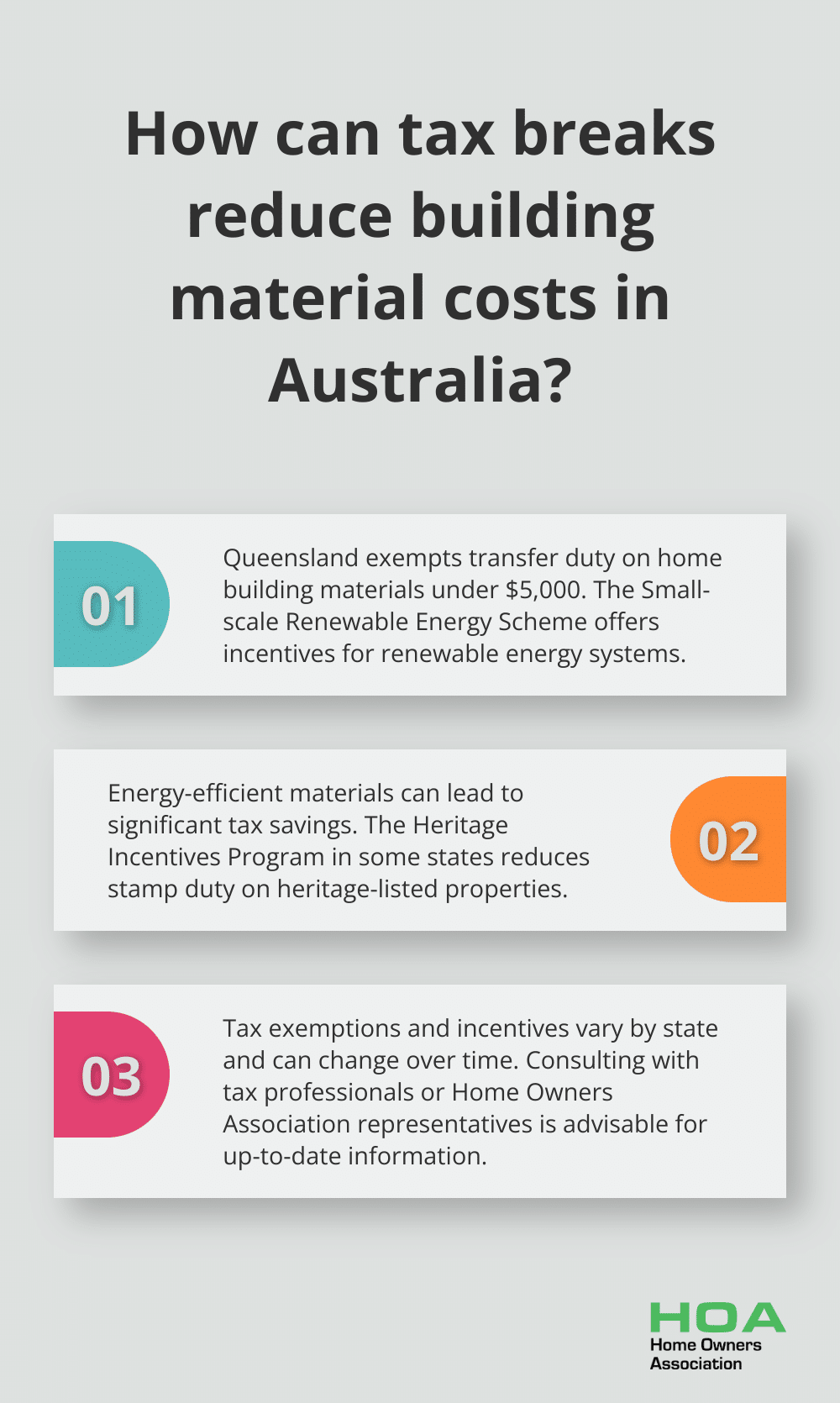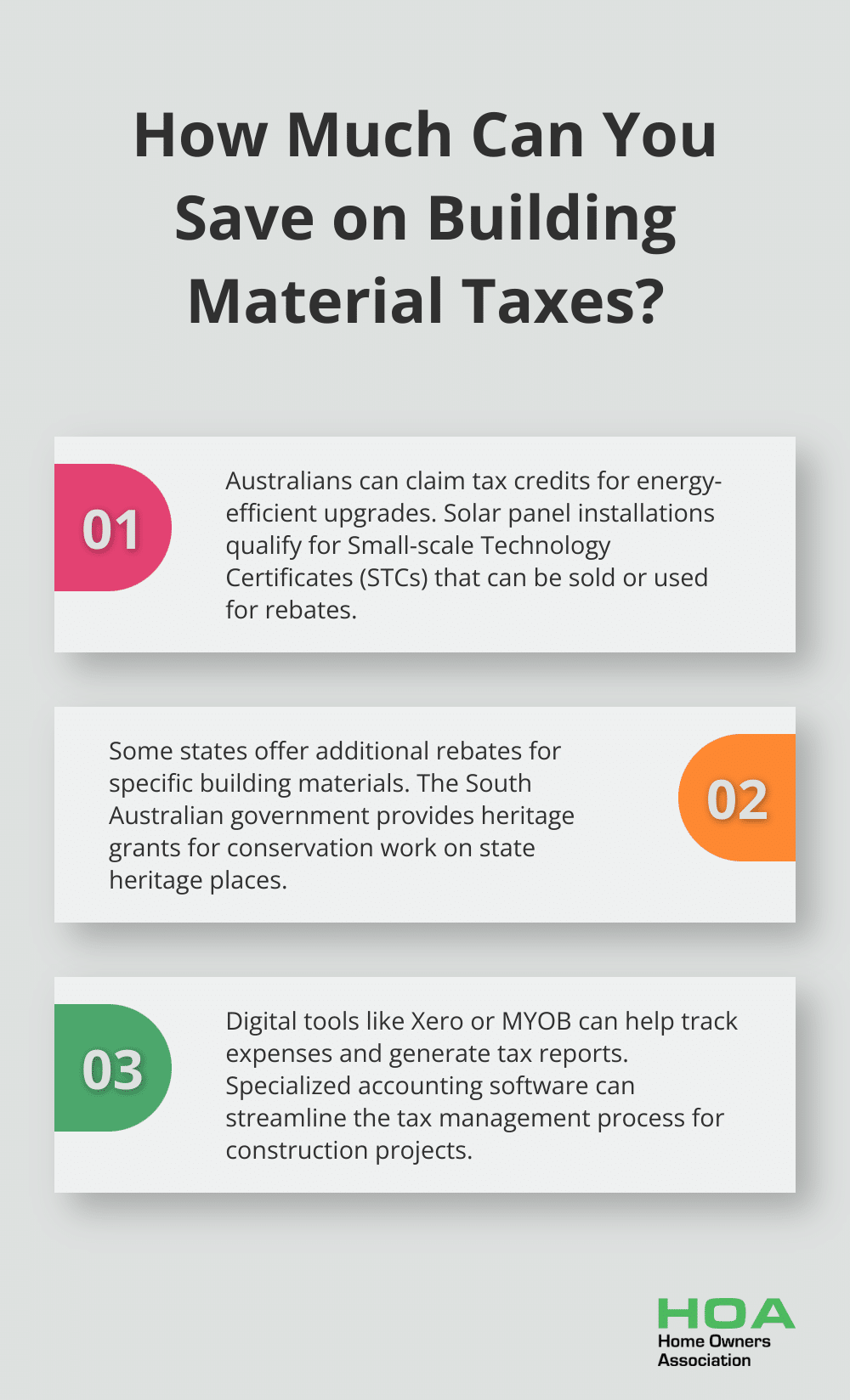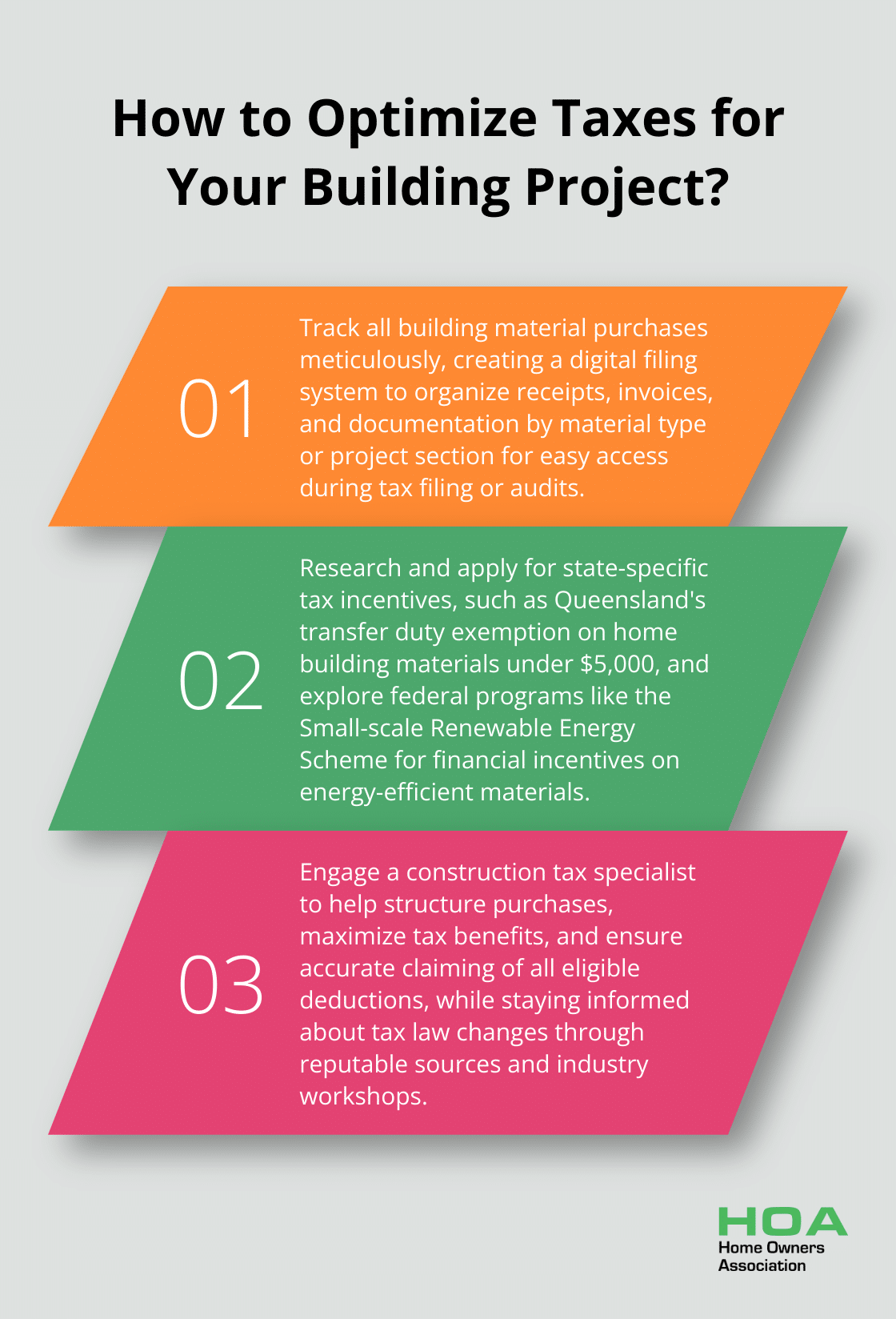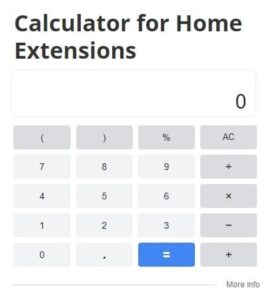
At Home Owners Association, we understand that navigating the complexities of tax on building materials can be challenging for homeowners embarking on construction projects.
Understanding the various taxes applicable to construction materials is essential for budgeting and compliance.
This guide will explore the basics of building material taxation, including GST, state-specific regulations, and potential exemptions.
We’ll also provide strategies to help you manage these taxes effectively and make informed decisions for your home improvement endeavors.
What Taxes Apply to Building Materials?
GST on Building Materials
The primary tax you’ll encounter when purchasing building materials in Australia is the Goods and Services Tax (GST). This broad-based tax adds 10% to the cost of most goods, services, and items sold or consumed in the country. When you buy items such as timber, concrete, bricks, or plumbing fixtures, you’ll typically pay an additional 10% on top of the base price.

Some exceptions exist. Certain sustainable options may be GST-free or eligible for reduced rates. These can include water-saving devices and other energy-efficient materials. It’s best to check with your supplier or a tax professional to determine if any of your planned purchases qualify for these exemptions.
State-Specific Taxes and Regulations
While GST is a federal tax, each state and territory in Australia may impose additional taxes or regulations on building materials. Here are some examples:
- Stamp Duty: Some states levy stamp duty on the purchase of building materials, particularly for large-scale construction projects.
- Land Tax: If you purchase land for construction, you may need to pay land tax (which varies by state).
- Construction Industry Training Fund (CITF) Levy: Some states (e.g., South Australia) impose a levy on construction projects to fund industry training initiatives.
Managing Tax Compliance
To ensure compliance with tax regulations, you should keep detailed records of all your building material purchases. This includes invoices, receipts, and any documentation related to tax exemptions or special considerations.
It’s advisable to consult with a tax professional who specializes in construction projects. They can provide tailored advice based on your specific situation and help you navigate the complexities of building material taxation.
Tax laws and regulations can change, so it’s important to stay informed about any updates that may affect your project. Regular checks of the Australian Taxation Office (ATO) website can help you stay up-to-date with the latest tax information related to building materials.
Tax Planning for Construction Projects
Effective tax planning can help you manage the costs associated with building materials. Consider these strategies:
- Bulk Purchases: Buying materials in bulk can sometimes lead to discounts, potentially offsetting some of the tax costs.
- Timing of Purchases: In some cases, the timing of your purchases can affect your tax obligations. Consult with a tax professional to determine if there are advantageous times to make large purchases.
- Energy-Efficient Choices: Opting for energy-efficient materials may not only reduce your GST burden but could also lead to long-term savings on energy costs.
As we move forward, it’s important to consider potential exemptions and special considerations that may apply to your building materials. These can significantly impact your overall tax obligations and project costs.
Tax Breaks for Building Materials
Tax-Free Thresholds
Australia offers several tax exemptions and incentives that can reduce the overall costs of building materials. Some states provide exemptions on materials used for residential construction up to a specific value. For instance, Queensland doesn’t charge transfer duty on home building materials valued under $5,000. It’s important to check with your local tax office or a qualified tax professional to understand the specific thresholds in your area.
Energy-Efficient Materials
The selection of energy-efficient building materials can lead to significant tax savings. The Australian government provides various incentives to promote sustainable construction. The Small-scale Renewable Energy Scheme offers financial incentives for households and businesses to install small-scale renewable energy systems like rooftop solar, solar water heaters, and heat pumps.
Heritage Building Considerations
Special tax considerations may apply if you work on a heritage-listed property. The Heritage Incentives Program (available in some states) involves full or partial reduction of stamp duty on sales of heritage listed properties, with the aim of encouraging investment in heritage conservation.
Navigating Tax Benefits
The complexities of building material taxation require expertise to navigate effectively. Home Owners Association has assisted numerous members across Australia in maximizing their tax benefits while ensuring compliance with local regulations. Our guidance has proven valuable for homeowners undertaking construction projects, often resulting in cost savings and smoother project execution.
Staying Informed
Tax laws can change, and what applies in one state may not apply in another. It’s advisable to consult with a tax professional or reach out to your local Home Owners Association representative for the most up-to-date and location-specific advice. The next section will explore effective strategies for managing tax on building materials, including proper record-keeping and utilizing available tax credits and deductions.

How to Manage Building Material Taxes Effectively
Meticulous Record-Keeping
Effective tax management for building materials requires homeowners to maintain detailed records. Keep all receipts, invoices, and documentation related to your building material purchases. This includes the materials themselves and any associated costs (such as delivery fees or installation charges).

Create a digital filing system to organize your records. Scan paper receipts and store them alongside digital invoices. Categorize your expenses based on the type of material or the specific part of your project. This organization will prove invaluable when you claim deductions or face an audit.
Maximizing Tax Credits and Deductions
Take advantage of available tax credits and deductions to reduce your overall tax burden. The Australian Taxation Office (ATO) offers various incentives for homeowners, particularly for energy-efficient upgrades.
If you install solar panels, you may qualify for Small-scale Technology Certificates (STCs) which you can sell or assign for a rebate on your installation costs. Water-saving devices and insulation materials often qualify for tax benefits as well.
Research state-specific incentives. Some states offer additional rebates or deductions for using certain types of building materials or for renovating heritage properties. The South Australian government provides heritage grants for conservation work on state heritage places, which require professional heritage advice and prepared scoping.
Collaborating with Tax Professionals
Engage a tax professional who specializes in construction. These experts stay current with the latest tax laws and can identify opportunities for savings that you might overlook.
A construction tax specialist can help you structure your purchases and timing to maximize tax benefits. They can also assist in preparing detailed tax returns that accurately reflect your building material expenses and ensure you claim all eligible deductions.
While hiring a professional incurs a cost, the potential savings and peace of mind often outweigh the expense. Regular communication with your tax professional can help you make tax-smart decisions as your project progresses, rather than trying to optimize your tax position after the fact.
Utilizing Digital Tools
Implement digital tools to streamline your tax management process. Many accounting software packages (such as Xero or MYOB) offer features specifically designed for construction projects. These tools can help you track expenses, categorize purchases, and generate reports for tax purposes.
Some apps allow you to scan receipts on the go, ensuring you don’t miss any deductible expenses. Try to integrate these tools into your daily routine to maintain accurate and up-to-date records throughout your project.
Staying Informed on Tax Changes
Tax laws and regulations change frequently. Stay informed about updates that may affect your project. Subscribe to newsletters from reputable sources (such as the ATO or industry associations) to receive timely updates on tax-related matters.
Attend workshops or webinars focused on construction taxation. These events often provide valuable insights and allow you to ask questions specific to your situation. Home Owners Association members have access to exclusive educational resources that cover the latest developments in building material taxation.
Final Thoughts
Tax on building materials presents a complex challenge for homeowners undertaking construction projects. Effective management requires meticulous record-keeping, utilization of available credits, and collaboration with tax professionals. Homeowners who implement these strategies can optimize their tax position and potentially save significant amounts on their projects.

Tax laws and regulations change frequently, so staying informed about updates is essential for making sound decisions throughout the construction journey. Regular checks of official sources and attendance at industry events help homeowners stay ahead of changes that may impact their projects. Seeking professional advice is highly recommended for complex projects or situations with unclear tax implications.
Home Owners Association supports Melbourne homeowners through every stage of their construction and renovation projects. Our members receive exclusive trade pricing, discounts on materials, and access to expert advice to ensure their projects meet the highest standards. We invite you to leverage our resources and community knowledge to approach your home improvement endeavors with confidence.





